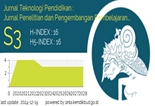Development of a Microcontroller E-Module Based on Grove Beginner Kit for Arduino Informatics Subject
Abstract
Keywords
Full Text:
PDFReferences
Adoe, W., Amali, L. N., Salim, S., & Katili, M. R. (2022). Pengembangan Video Animasi Menggunakan Model 4D Untuk Pembelajaran Anak Usia Dini.
Arkadiantika, I., Ramansyah, W., Effindi, M. A., & Dellia, P. (2020). Pengembangan media pembelajaran virtual reality pada materi pengenalan termination dan splicing fiber optic. Jurnal Dimensi Pendidikan Dan Pembelajaran, 8(1).
Fajri, R. M. A., Wahyudi, D. N., Ni’mah, E. S., Nugroho, F., Rahmeisi, N., Shaikh, S. S., Ashari, I., Fayyed, M. N. Al, & Putri, I. A. (2024). Penerapan Pemrograman C++ dalam Pengembangan Alat Elektronik Sederhana untuk Mahasiswa Teknik Elektro (Vol. 3, Issue 1). http://jurnalilmiah.org/journal/index.php/majemuk
Fitria, E. (2021). Pengembangan buku elektronik materi indahnya kebersamaan dengan menggunakan book creator di kelas iv.
Gusrianto, R., & Rahmi, U. (2022). Pengembangan E-Modul Pada Mata Pelajaran Informatika Berbasis Kurikulum Merdeka Belajar Untuk Kelas VII SMP. Jurnal Bahana Manajemen Pendidikan, 11, 173–180. https://doi.org/10.24036/jbmp.v11i2
Hariyanto, B., MZ, I., SU, W., & Rindawati. (2022). 4D Model Learning Device Development Method of the Physical Geography Field Work Guidance Book. MATEC Web of Conferences, 372, 05008. https://doi.org/10.1051/matecconf/202237205008
Hartati, Djangi, Muh. J., & Burhayati. (2023). Penggunaan Book Creator pada Model Discovery Learning untuk Meningkatkan Hasil Belajar Kimia Peserta Didik. Jurnal Pemikiran Dan Pengembangan Pembelajaran, 5(3). https://www.ejournal-jp3.com/index.php/Pendidikan/article/view/784/697
Jafnihirda, L., Suparmi, Ambiyar, Rizal, F., & Eka Pratiwi, K. (2023). Efektivitas Perancangan Media Pembelajaran Interaktif E-Modul. INNOVATIVE: Journal Of Social Science Research, 3(1), 227–239.
Juliana, I., & Sulistyowati, R. (2023). Pengembangan E-Modul Interaktif Berbasis Aplikasi Book Creator Mata Pelajaran Produk Kreatif dan Kewirausahaan Kelas Xi BDP SMK PGRI 13 Surabaya. Jurnal Pendidikan Ekonomi (JUPE), 11(3), 328–334. https://doi.org/10.26740/jupe.v11n3.p328
Marisa, U., & Hakim, A. R. (2020). Pengembangan E-Modul Berbasis Karakter Peduli Lingkungan di Masa Pandemi Covid-19. Seminar Nasional PGSD UNIKAMA, 4, 323–330. https://conference.unikama.ac.id/artikel/index.php/pgsd/article/view/514
Marto, H. (2021). Modul Elektronik. https://penerbitpascasarjana.pps.ung.ac.id/
Mukhson, Muh. A., & Untari, R. S. (2024). Pengembangan E-Modul Instalasi Mikrotik Berbasis Android Pada Mata Pelajaran Administrasi Infrastruktur Jaringan Di SMK. Indonesian Journal of Applied Technology, 1(1), 17. https://doi.org/10.47134/ijat.v1i1.3089
Nardi Ardana. (2023). Pengembangan Modul Elektronik pada Mata Pelajaran Teknik Pemesinan Bubut. Jurnal Pembelajaran Inovatif, 6(2), 08–17. https://doi.org/10.21009/jpi.062.02
Rahayu, R., & Ismawati, R. (2024). Development of DBUS-Based E-Modules Using Book-Creators to Improve Students’ Critical Thinking Skills. JURNAL PENDIDIKAN IPA VETERAN, 8(1), 1–11. https://doi.org/10.31331/jipva.v8i1.2854
Salsabella, S., Iriani, T., & Saleh, R. (2023). Pengembangan Bahan Ajar E-Modul Mata Kuliah Konsep Arsitektur Menggunakan Model 4D (Vol. 5).
Syawal, I. (2021). Pengembangan Modul Pembelajaran Mikrokontroler Berbasis Online untuk Mahasiswa Teknik Elektro. Jurnal Pendidikan Teknik Elektro.
Yunus, Y. (2019). Validitas Media E- Modul Pemrograman Berorientasi Objek II Berbasis Problem Based Instruction. CURRICULA: JOURNAL OF TEACHING AND LEARNING, 4(3), 154–163. https://doi.org/10.22216/jcc.2019.v4i3.3596
DOI: https://doi.org/10.33394/jtp.v10i1.13899
Refbacks
- There are currently no refbacks.
Copyright (c) 2025 Rojian Ariza, I Wayan Sugianta Nirawana, Rusdiana

This work is licensed under a Creative Commons Attribution-ShareAlike 4.0 International License.
This Journal has been Indexed by:
Jurnal Teknologi Pendidikan
ISSN: 2656-1417 (Online)
ISSN: 2503-0620 (Print)
Published by Program Studi Teknologi Pendidikan, FIPP
Universitas Pendidikan Mandalika
Email: [email protected]

This work is licensed under a Creative Commons Attribution-ShareAlike 4.0 International License.















.png)






